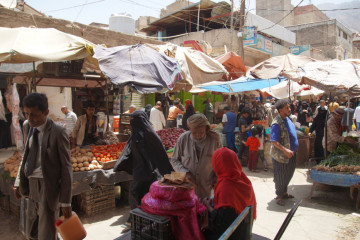

One week before Ramadan, the souks of Sanaa are bustling with activity. The malls are busy, the markets packed with people and produce. But most can't buy what they usually want or need for the holy month.
The holy month of Ramadan is a special occasion filled with happiness and gratitude. However, in war-ravaged Yemen, celebrations are dampened by harsh conditions; fuel shortages and skyrocketing grocery prices are but little respite for the vast majority of the population.
Mohammed Fuad, a local from Sanaa, struggles to conceal his frustration about this difficult period. Mohammed feels that Ramadan in Yemen is more challenging than ever this year. Speaking to The New Arab, Mohammed said "I went shopping fives days before the start of Ramadan. I had YR90000 ($150) in my pocket, and even this budget wasn't enough to buy our families necessities."
"The effects of war, when coupled with a dire economic crisis, is a deadly concoction"
He added, "Last year, $150 was enough to cover the whole month. This year, the same amount doesn't even cover half, this is painful and only adds to our misery of not being to enjoy this blessed month. Instead of having to endure bombs, we now have to endure price hikes."
The effects of war, when coupled with a dire economic crisis, are a deadly concoction. In an attempt to mitigate this, UN special envoy to Yemen, Hans Grundberg, has discussed a potential truce between the warring groups.
In response, the Houthi's spokesperson Mohammed Abdulsalam has said this is a positive step. Furthermore, the Saudi-led coalition has said it would stop military operations from 30 March till the end of Ramadan.
Should this truce materialise, this may yet bring some solace to civilians across Yemen. Rather than worrying about airstrikes, they can focus on performing their duties throughout Ramadan and enjoy the festivities of Eid Al-Fitr.
But this hope doesn't discount the rise in prices. One of the major concerns for Yemenis is the shortage of cooking gas. Abdullah Qasim lives in Sanaa with his seven-member family. Whilst Qasim has enough money to buy food, he wonders how he can cook them without gas.
Abdullah told The New Arab, "I used to buy one gas cylinder for YR3500. Now it costs me 8400 if I get it from the government and 20000 from the black market. The price hikes in cooking gas and fuel this Ramadan is unprecedented. This situation has robbed us of the sense of joy we were accustomed to experiencing before the war."
This situation has meant that the selling of firewood in Sanaa has seen huge increases in demand. Families have turned to this alternative to overcome the cooking gas shortages. "I bought bunches of firewood so that my wife can use it to prepare meals in Ramadan if cooking gas continues to be unavailable or expensive to purchase," said Qasim.
According to Abdullah, two necessities cannot be dispensed with: cooking gas and flour. While the cooking gas mostly comes from Yemen, mainly Marib province, the wheat is imported from multiple countries, including Ukraine. Ukraine has been in turmoil since the start of the Russian invasion. This development has left a direct negative impact on the price of wheat in Yemen.
Ali Ameen, a farmer from Hodeida province, told The New Arab that a low-income family in Ramadan could rely on wheat, oil, sugar, and some vegetables to survive. The family can adapt as long as these basics are available and affordable. Speaking with a sad tone, he said, "The price of wheat now has almost doubled, and this worsens the suffering of the needy households. Unless there is humanitarian aid, many families cannot feed themselves."
|
A recent report by the Studies and Economic Media Center (SEMC) pointed out that the Russia-Ukraine conflict will have an adverse effect on the humanitarian crisis in Yemen. "Yemen imports 34% of its wheat need from Russia and Ukraine," the centre's report said. It indicated that the price of wheat had risen 35% since the beginning of the war in Ukraine over a month ago.
Ammar Ahmed, a school teacher in Sanaa, said the skyrocketing prices and unpaid or low salaries are the recipes to a hard life, particularly during Ramadan. "The salary I receive cannot help me cover 20 percent of the items I need during this month. So I need to find work besides my teaching job to be able to provide my family with needed necessities."
Merchants in Yemen attribute the rapid price jumps to the shortages of fuel, saying that the fuel crisis has made the transportation of commodities more costly. Saleh Abdulla, a grocery owner in Sanaa, told The New Arab, "Every Ramadan since the breakout of war was difficult. Yet this Ramadan has been the hardest for multitudes of people. Some customers come with lists of groceries they need, and they return with half of what they want. Their money is not enough to help them pick up all the needed items."
Saleh remembers back to the days of pre-war Ramadan when people did not worry about the cooking gas, petrol, diesel, or the price of food products. He prays that the situation resolves itself quickly, so life can return.
The author is writing under a pseudonym to protect his identity





 Follow the Middle East's top stories in English at The New Arab on Google News
Follow the Middle East's top stories in English at The New Arab on Google News


